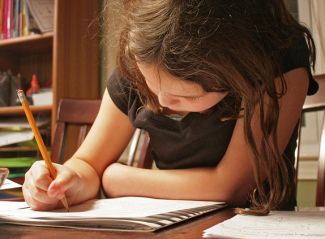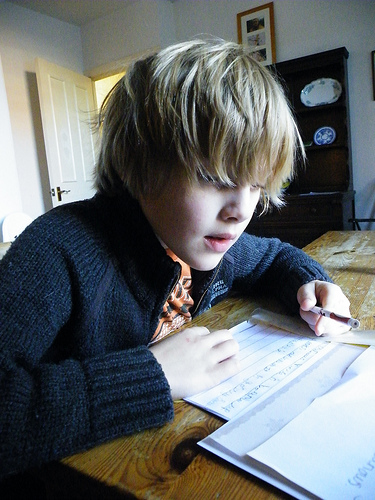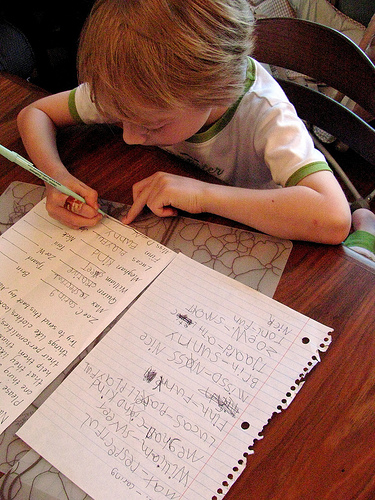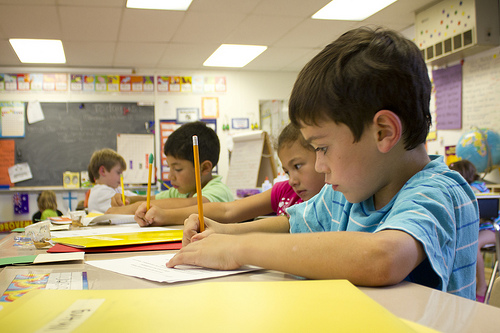Pokémon Scarlet and Violet
LQ: 9.45
Recommended Age: 4+
Skills Used: Flexibility, Planning, Mathematics, Reading, Writing

Writing is an extremely complex task that is not only difficult to learn but also hard to teach. Frustration with written work is a hallmark of alternative learners and children who are diagnosed with Attention Deficit/Hyperactivity Disorder and Dyslexia. Developing the skills necessary to become a good writer requires the use of many of the thinking skills, repeated practice, and the willingness to learn from one’s mistakes.
Children who struggle with writing typically have difficulty in one or more of the following four areas:
 https://js.hscta.net/cta/current.js//
https://js.hscta.net/cta/current.js//
 While handwriting may be considered a basic skill, early difficulty with writing letters, fine-motor control skills, or coloring within the lines is often an early signal of difficulty in written expression. Poor or very slow handwriting, which may have a variety of causes, is a direct measure of the output that young children are able to display in written tasks. As a result, there are many children with great ideas and the capacity to express themselves that may be hindered when they need to put the pen to paper and write, but who would do well by dictating or typing.
While handwriting may be considered a basic skill, early difficulty with writing letters, fine-motor control skills, or coloring within the lines is often an early signal of difficulty in written expression. Poor or very slow handwriting, which may have a variety of causes, is a direct measure of the output that young children are able to display in written tasks. As a result, there are many children with great ideas and the capacity to express themselves that may be hindered when they need to put the pen to paper and write, but who would do well by dictating or typing.
When children struggle with the mechanics of handwriting, they can become extremely frustrated with any type of writing task. Simple handwriting difficulties can lead to disinterest in learning the skills that promote written organization, the development of good content, and techniques that facilitate advanced writing skills.
Fortunately, there are a variety of technologies such as typing, speech recognition systems, and dictation devices that can circumvent these difficulties. It becomes very important for children who become frustrated and discouraged with handwriting skills to utilize these technologies at an early age, before they have become despondent and have given up on developing their writing skills.

Fluency is described as the capacity to efficiently and quickly produce written material of a high quality. Individuals who struggle with writing fluency may have problems getting even a few words onto paper and often do not finish their written work. Because of this, their written work is typically shorter and of poorer quality than that of their peers.
A common underlying cause of difficulty with writing fluency is poor and slow handwriting skills; children need to put forth an inordinate amount of effort in order to write legibly, or they give up legibility for speed. Other reasons for difficulty in writing fluency include language learning disabilities, difficulty in translating verbal or oral ideas onto paper, a lack of instruction or strategy as to how to initiate and sustain written work, and a poverty of content and understanding about the area of interest.

Written organization is described as the capacity to organize one’s written thoughts in a systematic manner; this is the ability to communicate a beginning, middle, and end in a piece of writing. Written organization facilitates the capacity to convey one’s thoughts in writing. It is a skill that builds upon expressive language capacities, organizational strategies, and practice.
Individuals who struggle with written organization may have good ideas, but they have difficulty in getting started on writing assignments and may present information in a jumbled fashion. Children with learning and attentional difficulties frequently struggle with written organization.

Fortunately, spelling has become a less important skill in today’s world. Individuals who are able to identify themselves as poor spellers have a number of tools such as spell check and auto-complete that can help them to manage this difficulty in their writing. However, learning to spell properly is a vital skill, and children who don’t address spelling deficits early on will have a difficult time overcoming them later in life.

In addition to educational games and apps that are specifically designed to encourage proper handwriting, writing fluency, written organization, and spelling, there are many other games and technologies that can serve to practice these skills while having fun.
These include:
All membership plans come with full access to our entire suite of tools learning guides, and resources. Here are a few of the ones we think you’ll like the most:
ABCDEFGHILPQOOASASASAASASASASASAD/
12345767890
BVCXZMNBVXCCXZZZZZZJJJJJJJJJJJJJJJJJJJJJJJJJJJJJJJJJJJJJJJJJJJJJJJJJJJJJJJJJJJJJJJJJJJJJJJJJJJJJJJJJJJJJJJJJJJJFFFFFFFFFFFFFFFFFFFFFFFFFFFFFFFFFFFFFFFFFFFFFFFFFFFFFFFFFFFFFFFFFFFFFFFF
MNBVCXZLKJHGFDSAPOIUYTTREWQ0987654321
RDDFEFDSTSFDDDDCGFDSZZZGSXDDFFFFFFFFCXXDDZDFSSSSSSSSSSSSTGDSDGMNBVCXZLKJHGFDSAPOIUY TREW